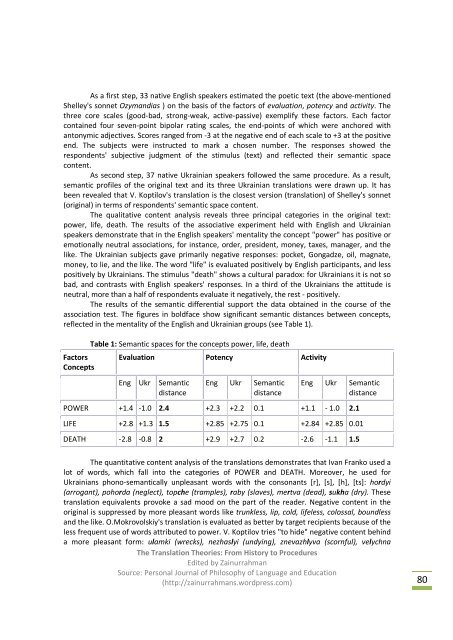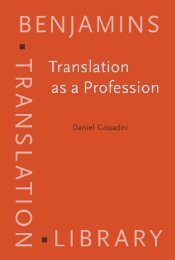Translation Theories.pdf
Translation Theories.pdf
Translation Theories.pdf
You also want an ePaper? Increase the reach of your titles
YUMPU automatically turns print PDFs into web optimized ePapers that Google loves.
As a first step, 33 native English speakers estimated the poetic text (the above-mentioned<br />
Shelley's sonnet Ozymandias ) on the basis of the factors of evaluation, potency and activity. The<br />
three core scales (good-bad, strong-weak, active-passive) exemplify these factors. Each factor<br />
contained four seven-point bipolar rating scales, the end-points of which were anchored with<br />
antonymic adjectives. Scores ranged from -3 at the negative end of each scale to +3 at the positive<br />
end. The subjects were instructed to mark a chosen number. The responses showed the<br />
respondents' subjective judgment of the stimulus (text) and reflected their semantic space<br />
content.<br />
As second step, 37 native Ukrainian speakers followed the same procedure. As a result,<br />
semantic profiles of the original text and its three Ukrainian translations were drawn up. It has<br />
been revealed that V. Koptilov's translation is the closest version (translation) of Shelley's sonnet<br />
(original) in terms of respondents' semantic space content.<br />
The qualitative content analysis reveals three principal categories in the original text:<br />
power, life, death. The results of the associative experiment held with English and Ukrainian<br />
speakers demonstrate that in the English speakers' mentality the concept "power" has positive or<br />
emotionally neutral associations, for instance, order, president, money, taxes, manager, and the<br />
like. The Ukrainian subjects gave primarily negative responses: pocket, Gongadze, oil, magnate,<br />
money, to lie, and the like. The word "life" is evaluated positively by English participants, and less<br />
positively by Ukrainians. The stimulus "death" shows a cultural paradox: for Ukrainians it is not so<br />
bad, and contrasts with English speakers' responses. In a third of the Ukrainians the attitude is<br />
neutral, more than a half of respondents evaluate it negatively, the rest - positively.<br />
The results of the semantic differential support the data obtained in the course of the<br />
association test. The figures in boldface show significant semantic distances between concepts,<br />
reflected in the mentality of the English and Ukrainian groups (see Table 1).<br />
Factors<br />
Concepts<br />
Table 1: Semantic spaces for the concepts power, life, death<br />
Evaluation Potency Activity<br />
Eng Ukr Semantic<br />
distance<br />
Eng Ukr Semantic<br />
distance<br />
Eng Ukr Semantic<br />
distance<br />
POWER +1.4 -1.0 2.4 +2.3 +2.2 0.1 +1.1 - 1.0 2.1<br />
LIFE +2.8 +1.3 1.5 +2.85 +2.75 0.1 +2.84 +2.85 0.01<br />
DEATH -2.8 -0.8 2 +2.9 +2.7 0.2 -2.6 -1.1 1.5<br />
The quantitative content analysis of the translations demonstrates that Ivan Franko used a<br />
lot of words, which fall into the categories of POWER and DEATH. Moreover, he used for<br />
Ukrainians phono-semantically unpleasant words with the consonants [r], [s], [h], [ts]: hordyi<br />
(arrogant), pohorda (neglect), topche (tramples), raby (slaves), mertva (dead), sukha (dry). These<br />
translation equivalents provoke a sad mood on the part of the reader. Negative content in the<br />
original is suppressed by more pleasant words like trunkless, lip, cold, lifeless, colossal, boundless<br />
and the like. O.Mokrovolskiy's translation is evaluated as better by target recipients because of the<br />
less frequent use of words attributed to power. V. Koptilov tries "to hide" negative content behind<br />
a more pleasant form: ulamki (wrecks), nezhaslyi (undying), znevazhlyva (scornful), velychna<br />
The <strong>Translation</strong> <strong>Theories</strong>: From History to Procedures<br />
Edited by Zainurrahman<br />
Source: Personal Journal of Philosophy of Language and Education<br />
(http://zainurrahmans.wordpress.com) 80

















